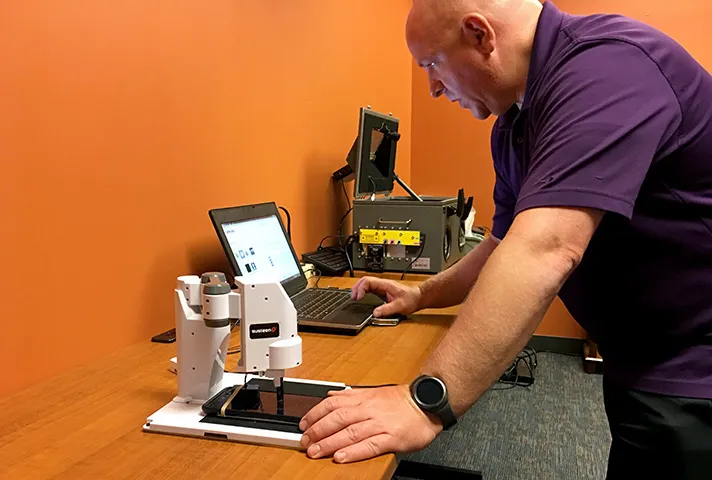Probation and pretrial services offices strive to achieve positive changes in individuals under supervision while also protecting the community. Using evidence-based practices and innovative technology, these offices focus on the efficient use of limited resources to maintain public safety and steadily reduce recidivism.
Progress in Reducing Recidivism
A multi-year study by the Administrative Office of the U.S. Courts (AO) showed that recidivism is on the decline in the federal criminal justice system. The report analyzed the criminal records of hundreds of thousands of offenders, from every district. Controlling for the varying criminal profiles and increased risk levels of the federal supervision population, the rearrest rate for people who started supervision in 2009 was approximately 19 percent, compared with 16 percent for the population that started supervision in 2013. While the decline is likely influenced by multiple factors, it coincides with a shift to evidence-based supervision practices and implementation of advanced actuarial assessment tools to help federal probation and pretrial services officers stratify their caseloads and prioritize issues within cases. With funding support from Congress, the Judiciary will continue pursuing an empirical, outcome-based supervision system.
Criminogenic Factors and Violence Curriculum
The federal probation system has worked to identify strategies to assist officers with addressing problem areas identified by the Post-Conviction Risk Assessment tool (PCRA), which assesses an individual’s risk of being rearrested for a new crime or of failing the terms of probation. The AO’s Probation and Pretrial Services Office has developed the Criminogenic Needs and Violence Curriculum (CNVC), a cognitive behavioral training program for probation officers that includes a series of manuals that target criminal thinking, social networks, education and employment, alcohol and drug abuse, and mitigating the risk of violence. The manuals reinforce the training of probation officers and treatment providers. The AO is pilot testing and studying the effectiveness of the CNVC with people on supervision. The results will determine the course of implementation in interested probation districts around the country.

The Judiciary’s National Forensic Laboratory in St. Louis provides services to courts around the country, helping probation officers get faster results than they would get using outside law enforcement agencies.
National Computer Forensics Facility
The Judiciary’s first national computer forensics laboratory marked its first full year of operation in 2018. The lab at the Thomas F. Eagleton U.S. Courthouse in St. Louis helps federal probation and pretrial officers around the country as they supervise increasingly tech-savvy populations. It is saving time and money because courts across the country can use the lab’s services in lieu of setting up their own, and they can get faster results than they had been getting using outside law enforcement agencies.
Since opening in late 2017, the lab has provided services to 36 of the 94 federal court districts and has examined over 250 devices. Partnering districts pay only postage for the services. The facility and its three-person staff are equipped with six work stations, an electronic evidence-collection tracking system, and more than 25 hardware and software tools to examine everything from mobile devices to gaming consoles. The lab has inspected devices for a variety of cases, including those involving child pornography, fraud, and terrorism.
While some federal court districts have their own in-house labs, the creation of a national facility is helping districts avoid lengthy wait times for computer forensic services provided by local law enforcement agencies and FBI offices. It can take months to get results from outside agencies, while the lab in St. Louis averages a turnaround time of two weeks. The time savings can be critical when officers need to examine the contents of seized devices from people suspected of new crimes or of violating their supervision terms.
Federal Probation and Pretrial Academy Accreditation
In November 2018, the Federal Law Enforcement Training Accreditation Board awarded accreditation to the Federal Probation and Pretrial Academy’s Initial Probation and Pretrial Training Program. The board is the accrediting body for all federal law enforcement training and support programs in the United States. To achieve accreditation, agencies must undergo a rigorous assessment to ensure compliance with the organization’s standards and procedures in the areas of administration, training staff, training development, training delivery, and distance learning. The honor recognizes the high quality of the academy’s program, its staff, and its professionalism.
Annual Report 2018
- Annual Report 2018
- Funding/Budget
- The Courts and Congress
- The Federal Bench
- Accountability and Resource Management
- Facilities and Security
- Public Outreach
- Court Operations and Case Management
- Defender Services
- Probation and Pretrial Services
- Human Resources
- Information Systems and Cybersecurity
- Recent and Proposed Amendments to Federal Rules
- In Profile
